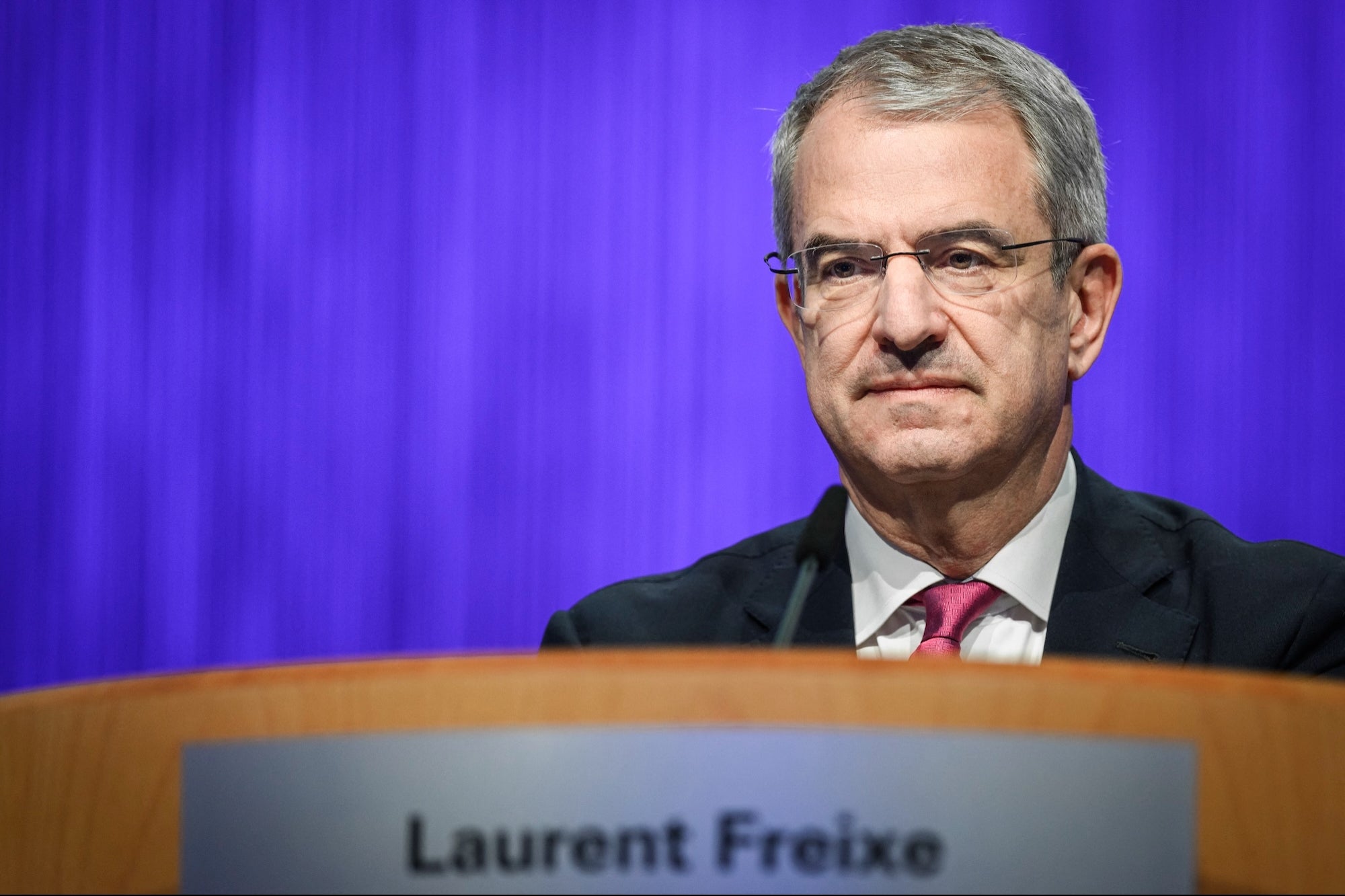Bank on It How the British Business Bank is driving the UK's bright start up future with CEO Louis Taylor
Opinions expressed by Entrepreneur contributors are their own.
You're reading Entrepreneur United Kingdom, an international franchise of Entrepreneur Media.

When Louis Taylor was CEO of Standard Chartered in Vietnam, a sudden problem with his own bank account gave him an unexpected jolt of empathy - and shifted his entire outlook. "I'd get a lot of complaints from customers about things on their accounts. They were vociferous," he recalls. "Then, one day, something went wrong with my own account - and my blood pressure went through the roof. You suddenly think - this is what it feels like to be a customer when things don't go right."
That moment didn't just explain the customer experience - it reframed his entire leadership mindset. "Alignment is really important," Taylor says, "but so is being approachable and staying in tune with what the organisation is there to do - and what it's experiencing in the market. And finally, a leader needs to put themselves in the mindset of their customer as much as possible."
Now, as CEO of the British Business Bank, the UK's government-backed institution that supports small and medium-sized businesses by improving their access to finance, he is challenging the status quo in how Britain funds its entrepreneurs. In a start-up landscape tangled with red tape and scarce capital, his guiding question is simple: "Are our processes built to help founders succeed, or just to make our own jobs easier?" It's a question grounded not in theory but in lived experience - and it fuels Taylor's mission to strip back bureaucracy and rethink how the UK backs its builders. "Who are we there to serve?" he says. This straightforward, almost obvious truth forms the heart of Taylor's philosophy - one shaped far beyond the boardroom, where it matters most: on the ground.
Solutions, solutions, solutions
At a time when headlines warn of economic slowdowns, volatile investment, and founders struggling to secure funding, the British Business Bank is recalibrating its approach. "The funding journey isn't uniform all the way through the different stages," Taylor says, referring to the difficulties entrepreneurs face today. "The earliest stage is not necessarily the hardest time, but it's definitely pretty tricky out there." Since its creation in 2014, the British Business Bank has built up a series of capabilities, a wide range of programmes - funds, guarantees, loans, and equity schemes - targeting different stages of business growth. But Taylor acknowledges that the system became fragmented. "We had lots of programmes individually, and the handovers weren't easy. The siloed nature made it hard." Now, that's changing. "We're creating a single banking business, a single investment business," he explains. "We want to provide solutions, rather than push programmes or interventions. It comes back to customer-centricity." He aims to deliver what he calls "a continuum of solutions" - a clear, consistent, and coherent pathway for founders struggling to make sense of the complex funding maze. The Bank plans to strengthen its existing capabilities and put them to more effective use. Reflecting on the state of the UK's entrepreneurial ecosystem, Taylor sees genuine cause for optimism. "Of course, we could do better - there are things that need fixing," he acknowledges. "But there's also a lot that's working well. If we ignore the good, we'll never improve on what's already strong."
Public good vs private urgency
Serving entrepreneurs while also answering to the government isn't always seamless. One of the more delicate balancing acts Taylor manages is reconciling the British Business Bank's public mission and the risk-driven mindset that entrepreneurs embody. "Alignment is really important," Taylor says. "But it's about making sure our business teams deliver for SMEs and entrepreneurs on as commercial a basis as possible." As Taylor puts it, "Entrepreneurs are fundamentally value maximisers, yet our shareholder is a government - which is a loss minimiser." The challenge is both philosophical and practical: how does a public bank juggle high-risk, high-reward ambition with the caution Westminster expects? "There's quite an alignment of outcomes," he argues. "Entrepreneurs want capital, support, market access. The government wants stronger growth, innovation, and ideally not to lose money in the process. So where we're able to operate best is where there is that mutuality of interest."
He admits the British Business Bank's frontline teams can be caught between the competing expectations. "Our Executive Committee's role is partly to insulate those teams from political pressures that might not maximise commercial value, translating those stipulations into workable solutions." It's a pragmatic stance, acknowledging the challenges while keeping focus on outcomes that benefit both the public and entrepreneurs. "The government has understandable demands - but they're not always value-maximising in a commercial sense. Our job is to translate those into something that still works in the real world." That balancing act will be tested even more as the Bank prepares to raise third-party capital for the first time. "We're going to find out whether our track record is good enough," Taylor says with confidence. "I think it is."
The funding bottleneck
The CEO thinks the UK ecosystem is in pretty good shape, broadly speaking. The data backs him up. "850,000 new companies were registered with Companies House last year. Not all of them are high-growth ventures, but a significant portion were," he adds. For all the talk of Britain as a start-up nation, there's a hard truth that founders learn the moment they try to grow: the leap from start-up to scale-up is where many stumble - not for lack of talent or ambition, but for lack of capital. And not just any capital, but patient, risk-tolerant investment that understands the long game. Taylor is blunt about it. "I think the biggest barrier is when entrepreneurs start to need institutional financial help," he says. "That's when the risk appetite of those institutions kicks in - particularly at the scale-up stage - and that's when it becomes most difficult to get the money they need to really grow."
It's a well-worn gap in the UK market: early-stage founders can often scrape together seed capital from angel investors or government-backed schemes, but when the time comes to raise serious money - to enter new markets, hire experienced teams, develop IP - the funding well runs dry. And it's not because the ideas aren't good. "We've got to get our investment institutions, who are professionally managed but also professionally risk-managed, to appreciate the absolute goldmine of opportunity that British entrepreneurialism represents," Taylor says. "Not just in consumer businesses, but in innovative tech and science-led companies as well. We're amazing at this stuff."
The ambition is there. The ideas are there. What's missing, often, is the capital that meets founders where they are - especially those building beyond London, or outside of traditional industries. That's part of why the British Business Bank exists. But even Taylor admits that government funding can only do so much. "The far bigger solution is market-driven," he says. "And that means a cultural shift in how British institutions view entrepreneurial risk."
Realism, resilience - and a little optimism
Some entrepreneurial traits, Louis Taylor believes, are universal. "Resilience, belief, willingness to experiment and course-correct," he says. Regardless of geography, founders must be able to build what he calls "a consistent, credible investment proposition from your business - identifying a problem, why you are the solution, whether what you do works, and whether it's deliverable." But spend enough time speaking to British entrepreneurs and a different pattern emerges: caution. It's not that UK founders lack ambition - but many still feel compelled to hedge their bets, downplay their potential, or even apologise for aiming high. Taylor recognises it. "There's a greater degree of optimism in the US among entrepreneurs," he observes. "In the UK, perhaps a greater degree of realism. And while both traits have their strengths, they can also go too far."
His solution? Something he calls ambient positivity. "Be realistic," he says, "but be ambiently positive about your prospects. Don't underplay how good you are. Know your numbers, understand your market - but back yourself." It's advice that's rooted not in motivational fluff, but in credibility. For Taylor, today's - and tomorrow's - fundable founder must demonstrate substance: a clear proposition, a validated product, and a market that wants it. "This isn't linear," he adds. "It's iterative. It takes resilience, creativity, and integrity." Taylor stresses that successful founders - now and into the future - must clearly define the problem they're solving, articulating why their solution works, and proving that the market wants it.
Backing Britain's innovation hotspots
Historically the British Business Bank was sector agnostic, particularly in the early stage. Following a recent government spending review, Taylor explains that the British Business Bank was given £4bn to back the new industrial strategy sectors - the eight key industrial sectors, aiming to catalyse growth where the country can really lead. "These sectors cover a significant part of the economy," he says, "and none exist in isolation. For example, advanced manufacturing overlaps with agriculture, even if agriculture itself isn't one of the eight sectors we're backing directly."
This targeted approach aims to not only support existing innovators but also to attract new investment - especially from private third-party sources that can multiply the British Business Bank's efforts. "We're hoping to catalyse third-party money alongside us to create a much larger pool of capital backing innovation in the UK," Taylor explains. This strategy reflects a nuanced understanding of the entrepreneurial ecosystem. Public funds can seed and support, but long-term growth depends on private investment confident in British innovation's potential.
A vision for founders
Looking ahead to 2030 and beyond, Taylor envisions founders who will thrive by sticking to the fundamental values of business - clear purpose, solid execution, and integrity - rather than chasing fleeting fads or flashy trends. It's a reminder that, even in a fast-changing world, the basics remain the bedrock of lasting success. While technologies and markets will evolve, these core traits remain vital. In a world of constant change, those qualities will be your greatest assets. "Being fundable isn't just about the tech or the market trends," he reflects. "It's about delivering consistent, credible value and staying true to that."
Britain's bold business reboot
In a climate where uncertainty dominates and growth feels harder to grasp, Taylor's leadership at the British Business Bank offers something rare: measured optimism rooted in action. His approach isn't about empty promises - it's about strengthening a startup ecosystem where founders are understood, supported, and empowered to succeed. For UK entrepreneurs, that means embracing realism without surrendering hope, thoughtful discipline without sacrificing creativity, and purpose with integrity. Scaling doesn't have to feel like a leap into the unknown. With the right infrastructure, it becomes a journey of steady forward momentum.
As the British Business Bank sharpens its focus - championing innovation-led sectors and drawing in private capital - it's mastering the delicate balance between public good and entrepreneurial drive. In doing so, it affirms a vital truth: The UK's future rests on leaders who are grounded, resilient, and unafraid to build. Taylor sees this as a moment to embody what he calls "ambient positivity," and to recognise what's already working in UK entrepreneurship - not just what needs fixing. For now, there's one clear challenge ahead:
"We've got to find a way to bring the quality of UK entrepreneurship to the attention of our major investment institutions - because they should be backing it far more than they currently do." Britain's founders don't need permission - they need belief, backing, and the capital to match their ambition. The horizon is wide open. The question is: who's ready to claim it?













